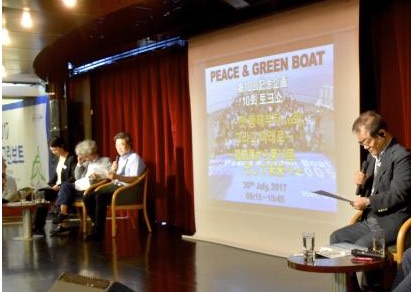. TOLERANCE & SOLIDARITY .
An article by Peaceboat
The first Peace & Green Boat Japan-Korea joint voyage set sail in 2005.
That voyage marked 60 years since the end of World War II, 60 years since the end of the Japanese colonial occupation of Korea, as well as 40 years since the normalization of relations between Japan and South Korea. This was also the year that the United Nations Framework Convention on Climate Change, the Kyoto Protocol, came into effect.

Over this time, we have seen the world appeal about the crisis of climate change caused by global warming, In Japan-Korea relations, we saw the rise in popularity of Korean culture as part of Hallyu/the Korean Wave. However this period of time has also been marked by severe political turbulence surrounding issues including Yasukuni Shrine, the Takeshima/Dokdo Islands, and the “Comfort Women”.
However we strongly share the belief that now more than ever, we must build the foundations of a peace and environment-oriented community in East Asia, one based on the combined strength of Japanese and Korean NGOs, and dedicated to protecting the lives of the people. With this goal in mind, we set out across the seas of East Asia.
Over the course of the past 12 years, through dialogue, mutual understanding, and trust, we have overcome numerous challenges to now be celebrating the 10th Japan-Korea joint voyage. With unique direct exchange made possible by using a large passenger vessel, we are proud to say that more than ten thousand participants to date have joined from both countries, creating friendship between citizens of Japan and Korea on an unprecedented scale.
(Continued in right column)
Peace Boat: Building a Culture of Peace around the World
(Continued from left column)
During this time, tragic incidents such as the Great East Japan Earthquake and Tsunami and subsequent nuclear disaster, as well as the Sewol Ferry Disaster, have served as grim reminders to reaffirm the importance of human life and safety, and to question the nature of politics and society which do not prioritise these things. The new administration in South Korea was born out of the series of one-million-candle demonstrations. We would like to express our agreement with and respect for the new administration’s recognition of the dangers of nuclear energy, and its stated intention to work towards a nuclear-free future. At the same time, we strongly call upon the Japanese government, which has ignored the lessons of the Fukushima Daiichi nuclear power plant disaster and has continued on a pro-nuclear energy path, to move towards renewable energy and away from nuclear power.
Since the first Peace & Green Boat voyage we have visited the city of Nagasaki four times. Nagasaki experienced the atomic bombing, and through these visits citizens of Japan and Korea have been able to hear directly the testimonies of the Hibakusha, the survivors of the attack. Our long-held wish was realized when on July 7 this year, the treaty to prohibit nuclear weapons was adopted at the United Nations. Unfortunately however, the governments of both Japan and South Korea are not participating in this treaty, citing the necessity of nuclear weapons as a deterrent. We strongly call upon both governments to join this treaty which seeks to avoid the catastrophic harm to humanity posed by nuclear weapons.
In response to climate change brought about by global warming, which also poses a grave threat to humanity, we will not only continue to devote our full energy and attention to this goal, but also comprehensively and creatively work towards the realization of the UN Sustainable Development Goals (SDGs). These goals include the promotion of renewable energy, peace, and climate action.
Lastly, through joint Peace & Green Boat activities we will work towards ensuring that the PyeonChang Winter Olympics next year and the 2020 Tokyo Olympics are sustainable Olympics where the environment is given the greatest level of consideration, so that they can be true festivals of peace. It is our intention that through this process, we can work towards building the foundations of an East Asia Peace and Environment Community.
Download this statement in three languages here: